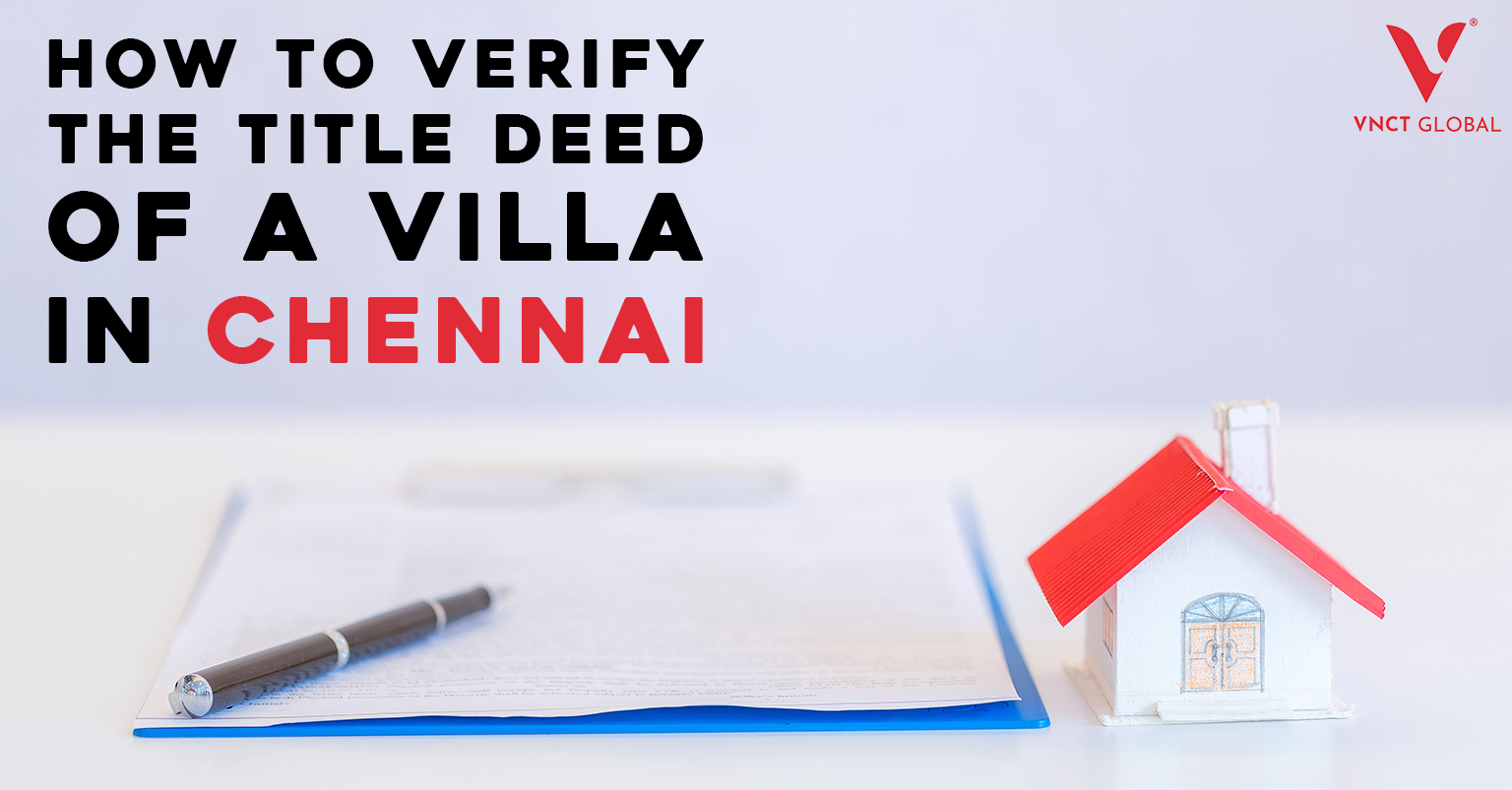Introduction
Buying a home is one of the biggest decisions you’ll ever make especially in a growing metro like Chennai. Amid the excitement of shortlisting apartments and planning your future, there’s one document you simply cannot afford to overlook the title deed.
So, how to verify the title deed and ensure your dream home doesn’t become a legal nightmare? Let’s break it down.
Whether you’re a local buyer or an NRI browsing properties from afar, this guide walks you through the essentials, complete with real estate insights, common red flags, and how top developers like VNCT Global assist homebuyers across the globe.
What is a Title Deed?
Think of the title deed as the birth certificate of your apartment. It’s the legal proof that someone owns the property—and it’s what you’ll need to prove you’re the rightful owner after purchase. It contains details like the current and previous owners, location boundaries, registration info, and more.
7-Step Guide on How to Verify the Title Deed in Chennai
Step 1: Ask for a Certified Copy
Before you dive deep, request a certified copy of the title deed from the seller or the builder. If you’re exploring villas in Chennai or projects by top builders like VNCT Global, getting a verified copy is usually straightforward.
Step 2: Check the Encumbrance Certificate (EC)
The Encumbrance Certificate shows if there are any legal dues or mortgages on the property. In other words, it tells you if the apartment is financially “clean.”
You can request the EC online via the TNREGINET portal, especially useful for NRIs or overseas buyers who rely on digital processes.
Step 3: Review Ownership History
Always trace ownership for the past 30 years. The goal? To ensure there are no disputes or illegal transfers. VNCT Global, one of the best villa developers in India, offers legal support to help NRIs access this information securely.
Step 4: Cross-Check Patta and Chitta
Patta and Chitta are land records specific to Tamil Nadu. These documents verify the nature of land (whether residential or agricultural) and the tax status. For projects like Brookside Residences or Palm Beach Villas, VNCT ensures these documents are clean and readily available.
Step 5: Verify Zoning and Land Use
You wouldn’t want to buy residential property on land zoned for agriculture or industry, right? Visit the CMDA or DTCP website to confirm zoning classifications. Reputed developers of villas in Coimbatore, Madurai, and Chennai typically build only on approved lands—but double-check anyway.
Step 6: Check Building Approvals and Certificates
Ensure the property has necessary approvals, including:
- Planning permissions
- Completion Certificate (CC)
- Occupancy Certificate (OC)
At VNCT Global, these are standard inclusions for every project, including Ocean Drive Villas, Creek Residences, and Park Villas.
Step 7: Consult a Property Lawyer
Even with all the paperwork, it’s wise to have a legal expert review everything. NRIs, in particular, benefit from this step, and VNCT Global provides end-to-end legal coordination to protect your investment abroad.
How to Verify a Title Deed Online in Chennai
Thanks to the TN government’s digitization, you can now:
- Download a certified copy of the deed
- Get the Encumbrance Certificate (EC)
- View Patta/Chitta records
- Track application status—all via https://tnreginet.gov.in
When Should You Use Online Verification?
- If you’re an NRI buying remotely
- If you’re in the early stages of exploring property
- Before paying a booking amount
VNCT Global regularly helps NRI clients with online verifications during overseas events in Dubai, Singapore, and Doha—where they also showcase their luxury villa projects.
Common Red Flags to Watch Out
Even if everything looks perfect on paper, keep your eyes open for:
Discrepancies in Deed Details
Incorrect boundaries, misspelled names, or unclear property descriptions can create legal issues later.
Ongoing Legal Disputes
Make sure there are no unresolved family claims or pending lawsuits tied to the property.
Unregistered or Improper Documents
Every sale must be properly registered. Avoid properties that are still under informal agreements.
VNCT Global: Supporting NRIs Every Step of the Way
At VNCT Global, we understand how complex buying property in India can be especially for NRIs. That’s why we offer:
- Remote document verification
- Trusted legal experts
- NRI support desks during international events
- Transparent paperwork for all our projects—from Palm Beach to Creek Residences
So whether you’re exploring villas in Madurai or premium gated communities in Chennai, you’ll never feel out of the loop.
Contact us VNCT Global today to get personalized assistance.
Conclusion
Buying an apartment or villa is more than just a financial decision—it’s an emotional milestone. By taking time to verify the title deed, you’re safeguarding your peace of mind and your family’s future.
With trusted partners like VNCT Global, you’re never alone in this process. Whether you’re an NRI or a first-time buyer in India, we’re here to guide you step by step.
FAQs for How to Verify the Title Deed
- What is a title deed and why is it important?
It’s a legal document proving ownership of your property. Without it, you can’t legally claim or sell your apartment. - How do I verify a title deed online in Chennai?
Use the TNREGINET portal to check Encumbrance Certificates, Patta, Chitta, and more. - Can NRIs verify a title deed remotely?
Yes. With developers like VNCT Global, NRIs can verify documents and even complete purchases from abroad. - What should I do if the title deed has errors?
Consult a property lawyer immediately. Errors could delay or jeopardize your purchase. - Is verifying a title deed necessary for apartments from reputed builders?
Absolutely. Even if you’re buying from the best villa developers in India, it’s wise to verify independently.





